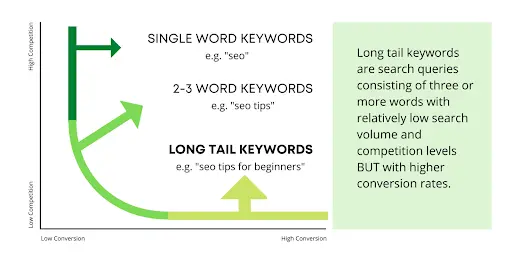
Uncovering Hidden Opportunities: How to Find Long-Tail Keywords with a Related Keywords Finder Tool

Long-tail keywords are the longer, more specific phrases that visitors are likely to use when they're closer to a point of purchase or when using voice search. They're not just keywords; they're key to understanding user intent. Tools like the best related keywords finder tool can help in identifying these.
The Magic of Long-Tail Keywords in SEO
- Less Competition, More Focus: Unlike their shorter counterparts, long-tail keywords face less competition but can attract highly targeted traffic. It's like fishing in a pond where the fish are fewer but more likely to bite, especially when using a related keywords finder tool online.

- Higher Conversion Rates: Users searching for long-tail keywords often know exactly what they want, which means they're closer to making a decision or a purchase.
Leveraging a Related Keywords Finder Tool
- The Role of a Related Keywords Finder Tool: Imagine having a tool that not only suggests keywords but also uncovers the less obvious, long-tail phrases. That's your related keywords finder tool, a must-have in your SEO toolkit.
- How These Tools Work: These tools, such as the best related keywords finder, analyze search data and user behavior to suggest a range of keywords related to your primary term, including the long-tail ones.
- Key Features to Look For: Opt for tools like the related keywords finder free online tool that offer a broad database, user-friendly interface, and in-depth analysis capabilities.
Step-by-Step: Finding Long-Tail Keywords
- Identify Your Primary Keyword: Start with a broad keyword related to your topic or industry. This will be the seed from which long-tail variations grow, identified through the best related keywords finder tool.
- Analyze the Suggestions: Examine the list of suggested keywords from a related keywords finder tool online. Look for longer phrases that are specific and might have lower search volumes but high relevance.
- Understanding User Intent: Interpret the long-tail keywords in terms of user intent. What is the user trying to achieve or find with this search?
you may also like: Improving Content Quality with a Keyword Density Checker Tool | Choosing the Right Keywords Rich Domains Tool: Top Picks and Features
Integrating Long-Tail Keywords into Your Strategy
- Strategic Implementation: It’s not just about finding long-tail keywords; it's about smartly integrating them into your content, using insights from a related keywords finder free online tool.

- Content Creation Around Long-Tail Keywords: Create content that directly addresses the queries represented by these keywords, using a related keywords finder tool online for guidance.
- Balancing Keyword Density: While using long-tail keywords, maintain a natural flow in your content. Avoid stuffing; keep it relevant and reader-friendly.
The Impact of Long-Tail Keywords
- Measuring Success: Track the performance of your long-tail keywords. Are they bringing in traffic? Are users engaging with your content?
- Adjusting Your Strategy: Based on performance data, refine your use of long-tail keywords. SEO is an ongoing process of learning and adjusting.
Advanced Tips for Long-Tail Keyword Success
- Exploring LSI Keywords: Latent Semantic Indexing (LSI) keywords are related to your primary keyword. Including these can help improve your content's relevance and context.
- Keeping Up with Trends: Stay updated with industry trends. This can lead to discovering new long-tail keywords that are gaining traction, with the aid of a related keywords finder tool.
- Localizing Long-Tail Keywords: If your business is location-specific, include local terms or landmarks in your long-tail keywords for local SEO advantages.
Challenges and Solutions
- Facing the Low-Volume Dilemma: Long-tail keywords typically have lower search volumes. Don't let this deter you. The quality of traffic they bring can be far more valuable.
- Combining Multiple Long-Tail Keywords: Use a combination of long-tail keywords across your content to cast a wider net, as suggested by the best related keywords finder.
The Future of Long-Tail Keywords in SEO
- Adapting to Evolving Search Patterns: As search patterns evolve, especially with voice search on the rise, long-tail keywords will become increasingly important.
- Embracing AI and Machine Learning: Emerging technologies like AI and machine learning are set to offer even more sophisticated ways of identifying and utilizing long-tail keywords, potentially revolutionized by tools like the related keywords finder tool online.
know more: Leveraging Related Keywords Finder Tools for Content Optimization | The Role of Keyword Research Tools in SEO Strategy
Conclusion: Long-Tail Keywords – Your SEO Treasure
In conclusion, mastering the art of finding and using long-tail keywords with a related keywords finder tool, like the best related keywords finder tool, can unlock immense opportunities for your SEO strategy. These keywords, identified through tools such as related keywords finder tools online, allow you to connect with your audience in a more targeted, meaningful way, leading to better engagement and conversion rates. Remember, in the vast ocean of SEO, long-tail keywords are the precise fishing lines that help you catch the right audience, especially when you use the related keywords finder free online tool. Keep exploring with tools like the best related keywords finder, keep optimizing, and watch as these hidden opportunities transform your online presence!
Free Tools: Free XML Sitemap Generator Tool Online | Free Website SEO Score Checker Tool Online
Frequently Asked Questions
1. How do I find similar keywords?
Use tools like Google Keyword Planner or SEMrush to discover related keywords. These provide related terms based on search volume and relevance. They're ideal for expanding your SEO and PPC keyword lists. Look for long-tail keywords and variations relevant to your audience.
2. Which tool is used for keyword search?
Google Keyword Planner, Ahrefs, and SEMrush are popular for keyword searches. These tools offer insights into the search volume and competition. They help identify high-volume and niche keywords. Advanced features include competitor analysis and ranking tracking.
3. What is the best keyword research tool?
The best keyword research tool varies by need. Google Keyword Planner suits beginners, while SEMrush and Ahrefs offer advanced features. They provide competitive analysis, keyword difficulty scores, and content gap analysis. Choose based on your specific SEO requirements.
4. What is the tool to find SEO keywords?
Google Keyword Planner, Ahrefs, and SEMrush are excellent for SEO keywords. They offer insights into search volume, keyword difficulty, and traffic potential. These tools also enable competitor keyword strategy analysis. They're essential for content optimization and SEO improvement.
5. Which is the best SEO tool?
SEMrush and Ahrefs are often considered top SEO tools. SEMrush excels in comprehensive data and site audits, while Ahrefs is known for backlink analysis. Both provide content optimization resources and technical SEO tracking. The choice depends on your specific SEO needs.
6. Is SEMrush free?
SEMrush offers a basic free version with limited features. For full functionality, including extensive keyword analytics and site audits, a paid subscription is needed. The free version is suitable for beginners or occasional use. Paid plans benefit businesses and SEO professionals with detailed research capabilities.
7. What is a backlink in SEO?
A backlink is a link from another website to yours, important in SEO as a signal of confidence. High-quality backlinks from relevant sites improve site authority and search rankings. Building backlinks through content marketing and collaborations is key. Quality is more important than quantity in backlink strategies.
8. Is SEMrush good for SEO?
SEMrush is highly effective for SEO, offering keyword research, site audits, and competitor analysis. It helps identify competitor keywords and suggests SEO improvements. The tool is beneficial for technical SEO issues and organic traffic strategies. It's a comprehensive tool for detailed SEO research and implementation.



